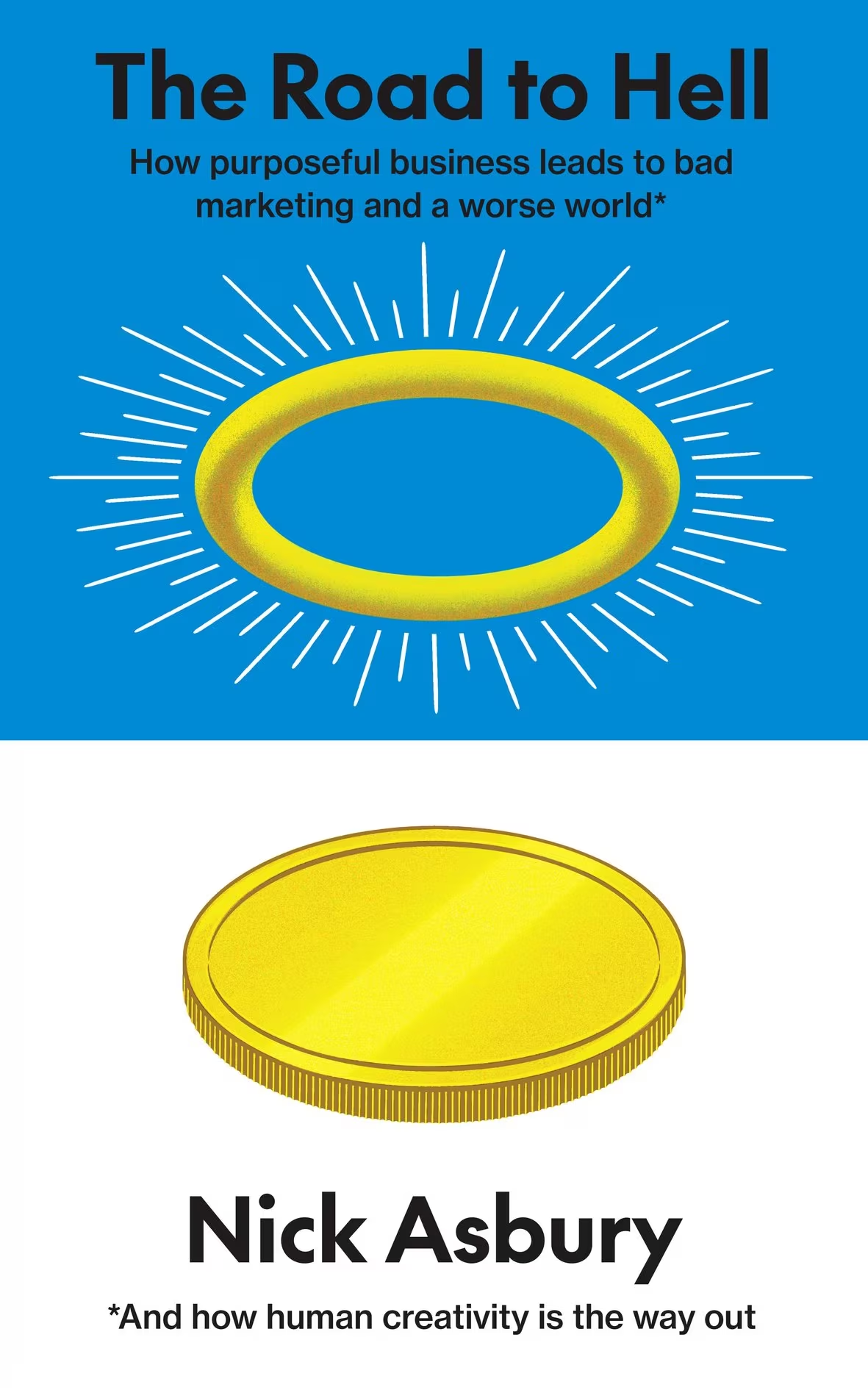Review: The Road to Hell
Nick Asbury argues that the business world’s embrace of “brand purpose” was a mistake. So, what next?
It all started with a Ted Talk. In 2009, Simon Sinek stood on stage in Seattle and offered up a more purposeful vision of marketing. “People don’t buy what you do,” Sinek said. “They buy why you do it.” Brands should therefore stop communicating how their products were different to their competitors’, but instead communicate the reasons why they made them, and the impact they hoped they would have on the world. The better that impact, and the more passionately it was conveyed to customers, the better the business would do. Good purpose equalled good business.
Sinek’s talk started a movement. Within the decade a business community that had been chastened by the 2008 financial crisis, and the subsequent anti-capitalist kicking it had received in the eyes of the public, had reorganised itself around the idea of “brand purpose”. By tying their brands to social and political causes, and making them the basis of their marketing campaigns, businesses figured they could be a “force for good”. Not only could, but should; this was a moral imperative. Businesses as large as Danone and Unilever reorganised themselves around the principles of purpose. Advertising awards ceremonies began to put purpose ahead of even creativity in their awards criteria.
Countless well-meaning people – including me – bought into the idea of “business as a force for good” for fairly straightforward reasons. Who wouldn’t like the idea of being able to impact the world positively with their day job? Who wouldn’t like the idea that they could have all the benefits of the for-profit sector with the moral glow of working for a charity? “Doing well by doing good” sounded lovely, and god knows there were enough problems to solve in the world.
That motivated reasoning might explain why so many people were enticed by Sinek’s thesis, despite it being self-evidently nonsense if you think about it for even a couple of minutes. People don’t buy what they buy through any particularly coherent, consistent or conscious process. If you asked a random punter to name the “why” for even a single brand they bought regularly, they’d fail miserably. People’s relationships with brands just aren’t that deep.
So what, though? Isn’t it a little churlish to take issue with companies trying to behave a little better and do a little good in the world? Nick Asbury argues, in his new book The Road to Hell, that it’s not only not churlish to challenge purpose, it’s essential. This preoccupation with purpose has, Nick thinks, been actively harmful from both a marketing perspective and a doing-good perspective. “Purposeful marketing,” he says, “is neither”.
It’s not good marketing, because it tends to produce abstracted, high-level, samey marketing that weakens the foundations of differentiation and distinctiveness on which effective marketing is built. It produces communications that consumers don’t care about, in part because it forgets the consumer and instead prioritises navel-gazing self-interest.
And it’s not good purpose, because it generally fails to do good. It turns purpose into self-interest, which inevitably distorts it, and it takes oxygen from organisations like charities that actually do some good in the world. It convinces us that we’re improving the world when we’re not, which is the most dangerous thing to do.
Nick’s argument against purpose is thorough and well-reasoned. It comes at a time when the pendulum feels like it’s swinging away from purpose. It’s probably not the final nail in the coffin, but there’s a completeness to Nick’s argument that makes it hard to believe that purpose will be long for this world.
What will replace it, though? What does a post-purpose world look like? Nick sets out his hopes in the final chapter of the book. As you might expect from his background as a copywriter, they focus mostly on advertising and communications. He hopes these industries will return to “humour, humility, and humanity”.
It’s a reasonable plea. It’s hard to argue with the idea that advertising would be better served by reclaiming the creativity that once sat at its heart, but also the empathy that was the wellspring of that creativity. That would mean advertisers understanding consumers, respecting them, recognising their responsibility to entertain them rather than to hector them, empathising with them more, and offering something that spoke to their actual needs and desires.
Nick suggests that for-profit businesses should refocus themselves on just that: on making a profit. They should stop pretending that they have a higher purpose, even internally. I think that’s valid as a caution against pretending that for-profit businesses are somehow socially benevolent world-fixers. But the idea that a business can be successful without any kind of purpose beyond just “make widgets to make a profit” seems wrong to me.
Businesses do not exist solely to maximise shareholder value, whatever Milton Friedman might have said. The very idea of “maximising shareholder value” is incoherent: it’s impossible to know in advance what will maximise it, and impossible to know in hindsight whether it has been maximised rather than merely increased. Businesses exist to do something, their profit is a side-effect of doing that something well, and it’s helpful for the people in them to know what that something is.
We saw the folly of this from the 1970s to the turn of the millennium, when the business world experienced a “shareholder value revolution”. This nakedly ideological movement denied that there was any purpose to business beyond profit-making, and pursued structural changes that ensured that this became the case. Most notable of these was the leveraged buyout, which loaded businesses up with so much debt that their entire focus became generating enough cashflow to service that debt. The consequences were disastrous, not just for society but for the businesses themselves.
John Kay, in his excellent book Obliquity, gives the example of Boeing. From the 1940s to the 1990s it became the largest aircraft manufacturer in the world on the back of a total devotion to aircraft design: its stated purpose was to “meet technological challenges of supreme magnitude” and to “eat, breathe and sleep the world of aeronautics”. Concerns about return on investment and shareholder value took a notable back seat.
That changed in 1996, when new CEO Phil Condit announced that “unit cost, return on investment, and shareholder return” were to be the new yardsticks by which executives would be measured, not some highfalutin’ purpose based on a love of aircraft. The result of his new focus was that the stock price cratered, and that Boeing gave up leadership of the civil airliner market to Airbus. He resigned amid a scandal in 2003.
Profit, when Boeing achieved it, was the side effect of a total dedication to their purpose of pushing the boundaries of aircraft design; when the purpose become profit, it fell from their grasp.
Amidst the wreckage of the 2008 financial crisis and the looming problems of climate change, many proponents of purpose looked around and saw much to dislike. The new, purposeful world of business that they created was a mistake, as Nick points out. But it would be an even greater mistake if rejecting purpose caused us to swing the pendulum all the way back again, and embrace once more the neoliberal worldview.
What do I hope for in a post-purpose world, then? As someone who inhabits a slightly different world to Nick in my day job, my main hope is that we don’t throw the baby out with the bathwater. I think it’s important to acknowledge that successful businesses have a purpose beyond making profit. This seems like a truism, and yet we collectively spent nearly 30 years denying it, and there are some who deny it still.
At the start of the book, Nick sets out what he sees as the five elements of purpose:
- It’s distinct from profit
- It’s about why you do what you do
- It has a moral and social valence
- It’s deeper than marketing
- It’s your reason for being
While I buy Nick’s broader argument wholeheartedly, I’m not convinced that every single one of those elements needs to be chucked as a result. I worry that, as the anti-purpose argument gains traction, all ideas of “purpose” will become toxic, and that businesses will think that any time spent on defining their purpose is time wasted.
A clear organisational purpose is important in a pragmatic sense, because it creates alignment within the business. It acts as a filter on decision-making, as a sort of Schelling point that allows for coordination without communication. I think this view is best articulated by Dan Davies in his similarly new book The Unaccountability Machine. Dan is an economist and, slightly ironically, he looks from the outside at the world of branding and sees much to admire in what you might call our credulity when it comes to purpose:
“Graphic designers are more or less the only people left in the modern industrial economy who ask questions like ‘What’s the purpose of this organisation? What’s the identity of this brand? What’s the meaning of what you’re doing? What are your values?’ and expect to get answers.”
Dan isn’t thinking about how organisations market themselves or what their social impact is, but rather how they organise themselves, make decisions, cope with the flow of information between their constituent parts, and balance short- and long-term change.
A well-understood purpose is a short-cut to decision-making, because it reduces the number of options that you have to consider. It is, in the slightly wonkish words of cybernetics, a “variety attenuator”. In the book, Dan uses the example of an orchestra:
“Having a consistent identity is a great way of reducing the variety you need to deal with, because it means that there are a lot of possibilities that can be simply ignored. If this is the backing orchestra for Elton John, nobody is going to need to consider whether the repertoire should include Wagner’s Ring cycle, or whether the tour itinerary should include a heavy metal festival.”
If everyone in the business can say “I’m going to do X, because that’s clearly in line with our organisational purpose”, and have their decisions be aligned because that purpose is unambiguous and clearly understood, then the quality, consistency and speed of decision-making will improve. If you don’t explicitly define that purpose, the business will either pull itself apart, or evolve an implicit purpose – which might be very different from the one you’d choose.
That purpose doesn’t need to be, like, solving child hunger. You certainly shouldn’t centre your marketing on it. But thinking about why your business exists and clearly communicating that internally is a worthwhile endeavour. It seems perfectly reasonable to call that your “purpose”, and indeed it passes four of the five components of Nick’s definition of “purpose” that he sets out at the start of the book.
The only part that it doesn’t meet is having a “moral and social valence”, and I think it’s that one that makes all the difference. Take away the social part of purpose and you have something worthy of paying attention to. It’s the social-purpose bathwater that we must throw away, but I think we can keep the rest. As Dan says:
“Consequently, the questions asked by the graphic designers aren’t just about getting a logo and some adverts that don’t look like shit. The ability to give truthful answers to the questions they ask is absolutely fundamental to organisational viability.”
Nick’s argument is brilliant, and his target just. But I’d hate for it to be so successful that it results in “the only people left in the modern industrial economy who ask these sorts of questions” to stop doing so.

